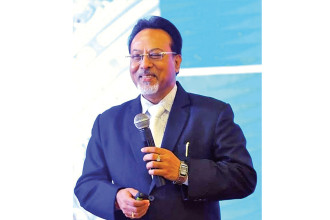
Dr Nishchal N Pandey is a recognised figure in Nepal's academic and policy-making circles with an impressive track record in diplomacy, research and international relations. As Director of the Centre for South Asian Studies, a leading think tank, and former Executive Director of the Institute of Foreign Affairs, he has dedicated decades to analysing regional dynamics and formulating strategic policies. With a PhD in political science, alongside degrees in English literature and law, Dr Pandey bridges the worlds of academia, policy and public service, making him uniquely positioned to comment on global political shifts and their implications for Nepal.
Dr Pandey’s expertise extends beyond his national boundaries, reflected in his visiting fellowships at renowned institutions such as the University of Hull, UK, and the Stiftung Wissenschaft und Politik in Germany. His extensive body of work including numerous books and articles delves into critical themes like regional cooperation, comprehensive security and Nepal's geopolitical strategies. This makes him a vital voice on how global events, such as the re-election of President Donald Trump, could impact not only the international order but also smaller nations like Nepal, grappling with unique developmental challenges.
In conversation with Business 360, Dr Pandey shares his insights on the potential effects of Trump’s policies on Nepal and the South Asian region. He delves into the intricacies of Trump's transactional governance style, the implications for global institutions, and the challenges for nations like Nepal in navigating an increasingly inward-looking global landscape.
President Donald Trump’s return to the presidency seems to evoke mixed reactions globally. To start with, how would you describe his temperament and approach to governance, particularly compared to his first term?
Let us begin by understanding the character of Donald Trump. Fundamentally, Trump is a businessman. All his life, he has approached situations from a transactional perspective. This means he evaluates every deal, every interaction, by what he can get in return for what he gives. His mindset is simple: If I am going to give you something, I expect something of equal or greater value in return.
For example, imagine he is sitting here for this interview. His first thought might be, "What am I going to gain from this?" That is the lens through which he views everything, whether it is a trade deal, an international negotiation or domestic policies. This transactional approach benefits countries or businesses that have something substantial to offer to the US. However, for countries like Nepal – landlocked, developing and with limited resources to leverage – this could mean being deprioritised.
“While no sitting US president has visited Nepal, there have been consistent high-level engagements that highlight the potential for deeper colla-boration. Moving forward, Nepal must adopt a more strategic and less reactive foreign policy
Would you say this transactional mindset impacts his foreign policy?
Absolutely, and it plays a pivotal role. Trump's approach makes him prioritise countries or partnerships that are mutually beneficial from a business perspective. This focus can have far-reaching implications. For instance, his policy might favour industrialised nations or entities that can provide significant returns to the US economy. For countries like ours, the challenge is clear: we do not have much to offer that directly benefits the Trump administration. Hence, we might find ourselves lower on his list of priorities.
What other aspects of his temperament influence his decision-making?
Another significant aspect is his focus on ending wars. Trump has repeatedly stated that wars are expensive and he is not interested in spending taxpayer money on conflicts where the US has no direct stakes. For instance, he has questioned the financial support provided to Ukraine, suggesting that Europe should take the lead in addressing such issues.
This inward-looking approach signals a shift in America’s global role. It is clear that Trump prioritises domestic financial management over international conflicts, marking a departure from previous administrations.
Can you provide examples of how this has played out in the past and what it might look like in the future?
Let us consider Syria where the armed uprising against Bashar al-Assad led to prolonged conflict. A more assertive administration might have taken a firm stance, but under Trump, we saw America receding from its traditional role. Countries like Turkey have become more influential in the region. Similarly, in Ukraine, Trump’s potential second term could see reduced US involvement. This will likely embolden other powers, such as Russia, while leaving Europe to shoulder the burden.
Do you think this inward focus could lead to a decline in US global leadership?
It is possible. By prioritising financial pragmatism over strategic alliances, Trump’s policies could result in a less influential US on the global stage. However, there is a flip side. In the short term, reduced involvement in conflicts could foster peace in certain regions. But long-term, the absence of American leadership could create power vacuums. For example, China's growing assertiveness in Asia might go unchecked, altering the balance of power in ways that could be detrimental to smaller nations like Nepal.
Speaking of China, Trump has been vocal about his trade policies, particularly tariffs. How will these affect global economies?
Trump’s stance on tariffs is another hallmark of his approach. He sees tariffs as a means of generating revenue and protecting American industries. However, this protectionism could escalate trade tensions, particularly with countries like China, Mexico and even Canada.
While this might bring short-term economic benefits to the US, the ripple effects on global trade could be significant. Higher tariffs mean higher prices for consumers, potentially leading to inflation. Moreover, it could disrupt supply chains, especially for export-dependent economies.
How does this protectionist stance align with his views on globalisation?
Trump is fundamentally sceptical of globalisation. He does not believe in giving concessions for free trade unless there is a direct benefit to the US. This approach could lead to strained relations with multilateral institutions like the World Trade Organisation. For developing countries like Nepal, which rely on fair trade practices and global cooperation, this could pose significant challenges.
What about issues like climate change?
Trump’s stance on climate change is well-known. He has dismissed the science behind it, prioritising fossil fuels over renewable energy. He is also critical of electric vehicles, calling them inefficient; a claim that is outdated given advancements in battery technology. This disregard for climate issues could hinder global efforts to combat climate change. Developing nations, which need support for climate financing and adaptation, might struggle to find allies under a Trump administration.
How about gender empowerment?
Trump’s track record suggests limited support for gender empowerment. While he has not explicitly outlined policies against it, his administration's actions, such as opposing quotas for women and limiting LGBTQ rights, speak volumes. For progressive countries like Nepal, which have embraced gender inclusivity and LGBTQ rights, this could create ideological friction.
What should Nepal’s priorities be in dealing with a second Trump administration?
Nepal needs to revamp its foreign policy apparatus. Our approach has been reactive, often dictated by domestic political changes. For instance, frequent ambassadorial changes disrupt continuity and weaken our international presence. We must also focus on strengthening ties with key neighbours like India and China while maintaining a pragmatic relationship with the US. Our foreign policy should be proactive, not just responsive.
Do you see any immediate challenges for Nepal in this context?
Several. Our rankings on indices like corruption and passport strength highlight systemic issues. We also face challenges like the EU ban on Nepali airlines, which has not been resolved. These are areas where a strong foreign policy could make a difference.
Nepal’s foreign policy is at a crossroads, with multiple challenges demanding urgent attention. One pressing issue is the outward migration of youth. This has become an alarming trend, draining the nation of its most productive demographic. While migration is not unique to Nepal – many countries grapple with similar issues – we have not created a domestic environment that can compete globally. For example, in Bangalore, India, professionals are returning because wages and opportunities have started to match those in Silicon Valley. In contrast, Nepal struggles to retain its youth because of limited opportunities, political instability and inadequate infrastructure for growth.
Another critical issue is Nepal’s passport ranking, which remains among the weakest globally. This restricts our citizens’ mobility and reflects poorly on our diplomatic standing. Moreover, the ongoing EU aviation ban on Nepali airlines is a glaring embarrassment. Despite operating modern aircraft like the Airbus wide-body, we have not managed to resolve safety concerns. This has been a setback not only for tourism but also for our global image.
These challenges are symptoms of a larger issue – out foreign policy lacks a strategic and coordinated approach. For Nepal to thrive in the global arena, we need a stronger vision and better execution.
How do you think Trump’s term could impact Nepal in terms of migration and trade?
Trump’s policies are known for being protectionist, particularly regarding immigration. His stance could significantly affect Nepali migrants in the United States. Trump has already expressed plans to tighten immigration laws, including rejecting citizenship based on birthright and imposing stricter conditions on Permanent Resident (PR) holders and the Diversity Visa (DV) lottery programme. This will directly impact thousands of Nepali families who rely on these pathways to build a life in the US.
In terms of trade, Nepal is a small player in US markets. Our export basket is limited, and as such, we are not a significant priority for the US government. Trump’s focus has always been on China and any tariffs or restrictions he imposes on Chinese goods could have indirect consequences for Nepal. For example, increased costs for Chinese products in the US might open up niches for other countries but Nepal lacks the capacity to step into such roles due to our limited industrial output and infrastructure.
Do you think Trump’s policies could have a broader impact on global institutions like the United Nations and WTO?
Absolutely. Trump’s previous disdain for international institutions like the UN, WTO and even NATO has already sent shockwaves through the global order. If he continues to undermine these organisations, the consequences will be severe, especially for smaller countries like Nepal that depend on multilateral platforms for aid, advocacy and development.
One specific area of concern is climate financing. Nepal is a country that has contributed minimally to global emissions yet suffers disproportionately from the effects of climate change. If Trump weakens global commitments to climate action, countries like Nepal will have to rely more heavily on the EU, Scandinavia, and other progressive nations for support. This could slow down our progress in addressing climate-related challenges such as glacial melt, flooding and agricultural disruption.
How do you see Nepal’s aid relationship with the US evolving under a Trump administration?
Historically, Nepal has enjoyed strong support from the US, regardless of the administration in power. Republican governments, in particular, have often been more engaged with Nepal. For instance, during President Dwight D Eisenhower’s tenure, late king Mahendra received the rare honour of addressing both Houses of Congress. Similarly, high-profile visits like those of former Vice President Spiro Agnew and former Secretary of State Colin Powell have underscored the importance of the Nepal-US relationship.
Under Trump, I don’t foresee a significant reduction in aid. However, Nepal needs to be proactive in identifying areas of mutual interest. For example, we could strengthen collaboration in disaster management, joint military training and development programmes. Trump’s administration is transactional in nature, so we must present clear, mutually beneficial proposals to maintain and grow this partnership.
You mentioned Nepal’s foreign policy being inconsistent. Can you provide examples?
A striking example of Nepal’s inconsistent approach is the Gaza crisis. During this conflict, the Ministry of Foreign Affairs urged Nepali workers in the region to prioritise their safety and leave the area. However, the Ministry of Labour simultaneously advertised job opportunities in the same conflict zone. This lack of coordination between ministries not only confuses the public but also damages Nepal’s credibility on the international stage.
Similarly, our foreign policy often appears individual-centric, with key decisions influenced by the personalities in power rather than a cohesive national strategy. This approach is unsustainable, especially in a world where geopolitics is becoming increasingly complex. Nepal needs an institutionalised framework that prioritises long-term national interests over short-term gains.
How would you summarise Nepal’s relationship with the US and its prospects moving forward?
Nepal’s relationship with the US is rooted in history and mutual respect. We were among the first countries in the region to establish diplomatic ties with America, even before India and China. This speaks volumes about the importance of our bilateral relationship.
While no sitting US president has visited Nepal, there have been consistent high-level engagements that highlight the potential for deeper collaboration. Moving forward, Nepal must adopt a more strategic and less reactive foreign policy. By focusing on areas like disaster management, trade and education, we can strengthen our ties with the US and navigate the challenges of a changing global order.
What is your overall outlook on Trump’s second term?
It is a mixed bag. On one hand, his focus on ending conflicts could bring short-term peace. On the other, his transactional approach and inward focus might weaken America’s global role, creating challenges for countries like Nepal. Ultimately, it is up to us to adapt and ensure that our policies align with the changing dynamics of international relations.






